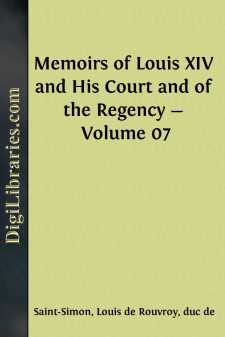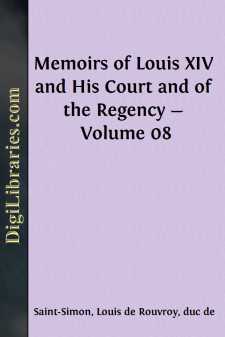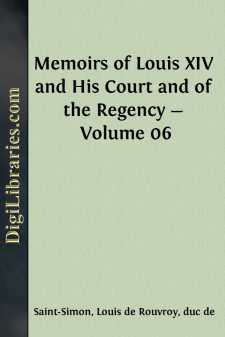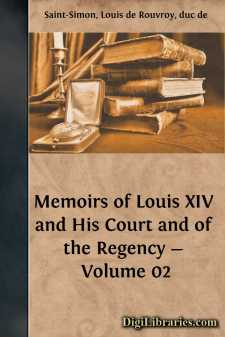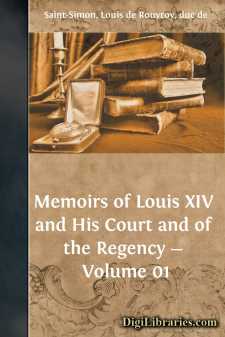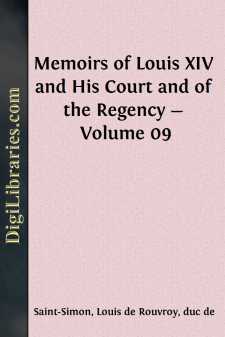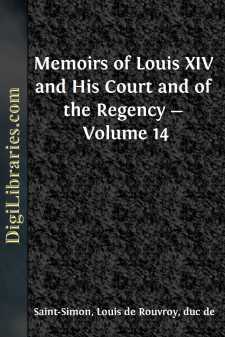Categories
- Antiques & Collectibles 13
- Architecture 36
- Art 48
- Bibles 22
- Biography & Autobiography 813
- Body, Mind & Spirit 142
- Business & Economics 28
- Children's Books 17
- Children's Fiction 14
- Computers 4
- Cooking 94
- Crafts & Hobbies 4
- Drama 346
- Education 46
- Family & Relationships 57
- Fiction 11829
- Games 19
- Gardening 17
- Health & Fitness 34
- History 1377
- House & Home 1
- Humor 147
- Juvenile Fiction 1873
- Juvenile Nonfiction 202
- Language Arts & Disciplines 88
- Law 16
- Literary Collections 686
- Literary Criticism 179
- Mathematics 13
- Medical 41
- Music 40
- Nature 179
- Non-Classifiable 1768
- Performing Arts 7
- Periodicals 1453
- Philosophy 64
- Photography 2
- Poetry 896
- Political Science 203
- Psychology 42
- Reference 154
- Religion 513
- Science 126
- Self-Help 84
- Social Science 81
- Sports & Recreation 34
- Study Aids 3
- Technology & Engineering 59
- Transportation 23
- Travel 463
- True Crime 29
Memoirs of Louis XIV and His Court and of the Regency - Volume 05
Description:
Excerpt
Two very different persons died towards the latter part of this year. The first was Lamoignon, Chief President; the second, Ninon, known by the name of Mademoiselle de l'Enclos. Of Lamoignon I will relate a single anecdote, curious and instructive, which will show the corruption of which he was capable.
One day—I am speaking of a time many years previous to the date of the occurrences just related—one day there was a great hunting party at Saint Germain. The chase was pursued so long, that the King gave up, and returned to Saint Germain. A number of courtiers, among whom was M. de Lauzun, who related this story to me, continued their sport; and just as darkness was coming on, discovered that they had lost their way. After a time, they espied a light, by which they guided their steps, and at length reached the door of a kind of castle. They knocked, they called aloud, they named themselves, and asked for hospitality. It was then between ten and eleven at night, and towards the end of autumn. The door was opened to them. The master of the house came forth. He made them take their boots off, and warm themselves; he put their horses into his stables; and at the same time had a supper prepared for his guests, who stood much in need of it. They did not wait long for the meal; yet when served it proved excellent; the wines served with it, too, were of several kinds, and excellent likewise: as for the master of the house, he was so polite and respectful, yet without being ceremonious or eager, that it was evident he had frequented the best company. The courtiers soon learnt that his name vitas Fargues, that the place was called Courson, and that he had lived there in retirement several years. After having supped, Fargues showed each of them into a separate bedroom, where they were waited upon by his valets with every proper attention. In the morning, as soon as the courtiers had dressed themselves, they found an excellent breakfast awaiting them; and upon leaving the table they saw their horses ready for them, and as thoroughly attended to as they had been themselves. Charmed with the politeness and with the manners of Fargues, and touched by his hospitable reception of them, they made him many offers of service, and made their way back to Saint Germain. Their non-appearance on the previous night had been the common talk, their return and the adventure they had met with was no less so.
These gentlemen were then the very flower of the Court, and all of them very intimate with the King. They related to him, therefore, their story, the manner of their reception, and highly praised the master of the house and his good cheer. The King asked his name, and, as soon as he heard it, exclaimed, "What, Fargues! is he so near here, then?" The courtiers redoubled their praises, and the King said no more; but soon after, went to the Queen-mother, and told her what had happened.
Fargues, indeed, was no stranger, either to her or to the King. He had taken a prominent part in the movements of Paris against the Court and Cardinal Mazarin. If he had not been hanged, it was because he was well supported by his party, who had him included in the amnesty granted to those who had been engaged in these troubles. Fearing, however, that the hatred of his enemies might place his life in danger if he remained in Paris, he retired from the capital to this country-house which has just been mentioned, where he continued to live in strict privacy, even when the death of Cardinal Mazarin seemed to render such seclusion no longer necessary....



